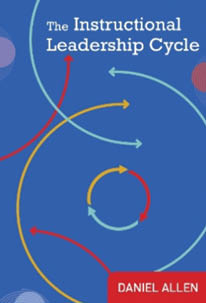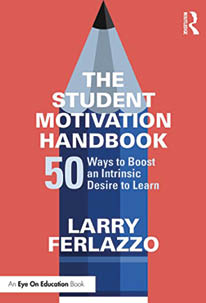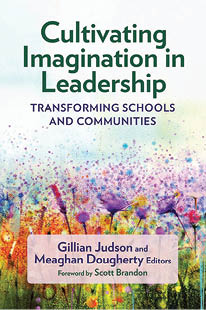Syllabus: October 2023
The Instructional Leadership Cycle

In The Instructional Leadership Cycle (Harvard Education Press), Daniel Allen offers educators a paradigm shift for school improvement. “Most school leaders know intuitively that improving instructional practice is the holy grail of their leadership practice,” he writes. As the general director at Lincoln School in Costa Rica, Allen knows firsthand that educational organizations must adapt, innovate, prioritize, and problem-solve to survive. To that end, he suggests that each school have its own shared language, visually displayed around the campus and verbally reiterated by all stakeholders. Allen also emphasizes the need for an adaptable set of professional practices, including conducting instructional rounds (walk-through observations), highlighting student work, teaching in a culturally responsive manner, posting the daily learning target in a common space, and following the 10/10 rule (students cannot leave the room the first or last 10 minutes of any class). He leaves readers with a metaphor about the educational process, comparing it to a pot of boiling water on a stove. “If the pot isn’t hot enough, the water will never gain the heat and energy necessary to boil. Alternatively, if you turn up the heat too high, the boiling water might overflow, creating a big mess. The work of the educational leader is to monitor the temperature.”
—Holly Langley, EdD
Assistant Principal, Sussex Technical High School, Georgetown, DE
“The Integrated Schools Podcast”

“The Integrated Schools Podcast,” hosted by Andrew Lefkowits and Val Brown, features eye-opening conversations on race and education that inspire hope for the future while acknowledging the legitimate hurdles that still exist in the present. Lefkowits, a dad who is white from Denver, and Brown, a mom who is Black from North Carolina, not only interview adults but also highlight student voices to identify, in specific ways, the impact of systemic racism in our schools and neighborhoods. For instance, the episode “Between the Lines: An EPIC Comeback” details how students in the EPIC Theatre Ensemble wrote a play to evaluate the impact of housing policies on school segregation. The play (excerpts of which are featured on the podcast) contains hilarious parodies while revealing the brutal truths around the funding of neighborhood schools. Another episode, “Centering Civil Rights in the Fight for Education,” includes an interview with Linda Darling-Hammond and her daughter, Kia Darling-Hammond. The authors discuss their book, The Civil Rights Road to Deeper Learning: Five Essentials for Equity. School leaders in states taking a hard-right stance on equity in schools may find it enlightening to hear the hosts discuss what equity means to the authors and why so many parents and even school staff feel like their voices aren’t heard.
—Alan Stanfield
Assistant Principal, Glacier High School, Kalispell, MT
The Student Motivation Handbook: 50 Ways to Boost an Intrinsic Desire to Learn

Now more than ever, maintaining student engagement is critical to the success of all students and the learning environment. In his book, The Student Motivation Handbook: 50 Ways to Boost an Intrinsic Desire to Learn (Routledge), Larry Ferlazzo looks at 50 ways to help students at any level get and stay motivated. As a longtime high school teacher at Luther Burbank High School in Sacramento, CA, Ferlazzo has deep expertise teaching social studies and English courses to English Learners. With this book, he focuses on four subjects relative to learning for all students—autonomy, competence, relatedness, and relevance. For each, he provides multiple methods to ensure that students not only feel empowered but have a desire to be engaged throughout their lessons. Among the 50 ways, Ferlazzo includes intrinsic motivators (e.g., promoting positive self-talk and emphasizing temporal comparisons) to complement the many extrinsic ones (e.g., candy and other rewards) used in classrooms around the world. His ultimate goal? To help educators better understand today’s learner and reduce frustration levels for all. School leaders will especially appreciate the “Edtech Toolbox,” which includes digital resources to share with classroom teachers for implementing suggested lesson plans and activities.
—Eric Basilo, EdD
Assistant Principal, Markham Woods Middle School, Lake Mary, FL
Cultivating Imagination in Leadership: Transforming Schools and Communities

Cultivating Imagination in Leadership: Transforming Schools and Communities (Teachers College Press) looks at how imagination can be harnessed in school leadership to create innovative change for the good of all students. Edited by Gillian Judson, an assistant professor at Simon Fraser University, and Meaghan Dougherty, a faculty member at Douglas College, the book is organized around the following themes: exploring possibilities, poetics of memory, and imagination’s role in social justice and equity. Practical stories from building leaders and insights from leadership scholars relate to these themes and are interspersed with discussions of human development and cognition. Thought-provoking questions that the book tries to answer include: What do educational leaders’ stories reveal about the role of imagination in leadership? Can imagination help leaders to build thriving school communities? And how can leaders push past “the way we have always done something” to generate new and innovative solutions to difficult problems? The book not only shows how imagination is a necessary ingredient for all successful leaders, but it also helps to get the creative juices flowing for how to use your imagination in school leadership.
—Janeen Ceparano Wilkins
Assistant Principal, Bettye Davis East Anchorage High School, Anchorage, AK
